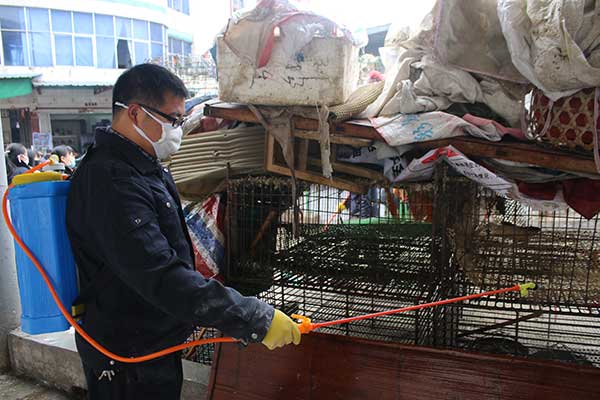|

|
|
A worker disinfects poultry cages at a market in Suichuan county, Jiangxi province, on Sunday. The county has ordered the closure of local poultry markets from Saturday to March 10. [Li Jianping/For China Daily]
|
The new strain of H7N9 bird flu virus confirmed earlier this month could become drug-resistant, experts say, while a leading specialist in respiratory diseases warns that it might be resistant already.
Human cases have been rising in China.
The new strain, two human cases of which were reported in Guangdong province, shows resistance to oseltamivir phosphate, a commonly used drug in the prevention and treatment of flu, said Zhong Nanshan, a member of the Chinese Academy of Engineering, according to a report published on Sunday by Nanfang Daily, a newspaper in the provincial capital of Guangzhou.
Although the two patients are resistant to the drug, oseltamivir phosphate has been effective for most human H7N9 cases, Zhong was reported as saying. “This shows most H7N9 viruses have not mutated to the new strain,” he said.
He Jianfeng, chief expert in infectious disease at the Guangdong Provincial Center for Disease Control and Prevention, said that although the new H7N9 strain shows resistance to the drug, the drug could still have an effect on the strain.
“Both patients have used oseltamivir phosphate before, so it is not known whether the drug resistance is caused by previous use of the dug or by a mutation of the virus,” He told Nanfang Daily. “But the possible drug-resistant nature of the new strain deserves more attention.”
Much of China has seen the H7N9 outbreak since the start of winter. In most cases, it has been linked to exposure to live poultry. In January alone, the Chinese mainland reported 192 human cases of the virus, including 79 deaths, making it the worst outbreak since the virus was first reported in China in 2013, according to the National Health and Family Planning Commission.
The total number of human cases this year increased to 296, including 94 deaths, as of Sunday, covering more than half of all provincial areas in China, China Central Television reported.
The new strain is more dangerous to poultry, but poses no new threat to humans, and it is not more infectious to humans at the moment, according to a statement by the Chinese Center for Disease Control and Prevention on Feb 19. Current research shows that the H7N9 virus is not easily transmitted between humans, according to the World Health Organization.
Zhong could not be reached for comment on Sunday.
He Xiong, deputy director of the Beijing Center for Disease Prevention and Control, said the new strain does not result in increased risk of human-to-human transmission of the virus, but unlike other H7N9 viruses, it can cause diseases in poultry, which should be studied further.
Only two human H7N9 cases have been reported in Beijing this year, and both of them involve patients who are from other parts of China and were transferred to Beijing for treatment, He Xiong said.
“There may be sporadic cases, but the possibility of a large-scale outbreak in Beijing is slim, as authorities and the public are well prepared,” he said, adding that scientists are still conducting research into the virus to ascertain whether it is linked to climate, to ensure better prevention and control.


